Leeds, UK
-
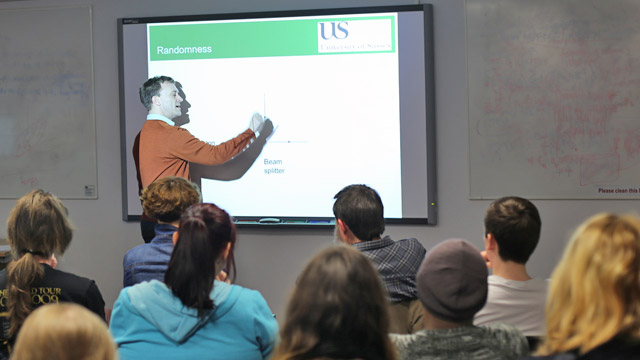
Making Use of Uncertainty: How Quantum Physics is Revolutionising Our Lives
On the microscopic scale the universe behaves in a weird and wonderful way quite contrary to our everyday experience. Objects can be in two places at the same time, cats can be both alive and dead, particles can tunnel through barriers, and randomness governs everything.
-
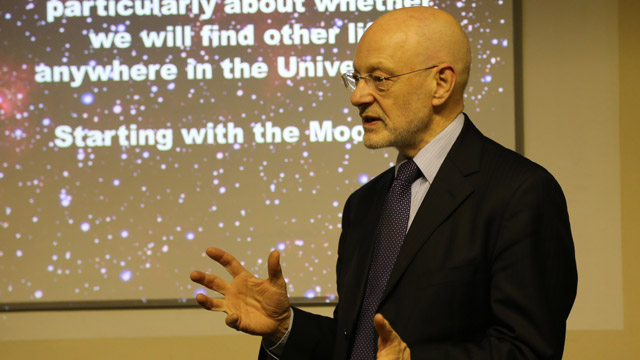
Is there life out there? (2014)
Four years ago the description of the Universe was changed from billions of stars in each of billions of galaxies to billions of planets in each of billions of galaxies. The probability of finding intelligent life out there looks like a certainty and however improbable life is, it looks as if we will find it sooner rather than later. How will it change our world?
-
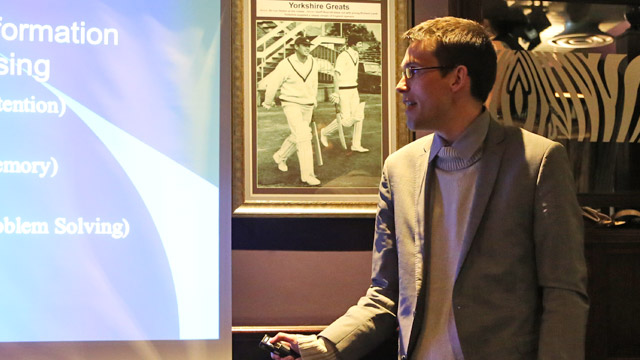
Widening the View: Looking at the limits of Human Perception
After the success of his SiTP talk, the award-winning "You know less than you think", Paul Hopwood is back for the sequel! Based around his Cognitive Psychology studies, the first talk focussed on the different stages of information processing in the human brain. By looking at research into the brain's ability to acquire, store, retrieve and use information; the talk highlighted that humans have a tendency to severely overestimate their ability to perform these tasks.
-
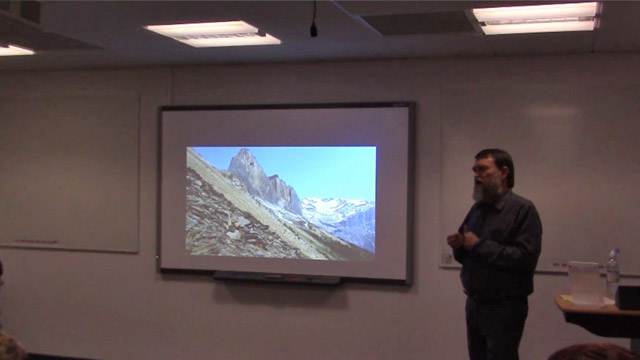
God of the Galapagos
Talk by Dr Karel de Pauw on the the religious and philosophical implications of Darwinism. When I asked Karel for an abstract he suggested the quote that first inspired him to give a talk on this topic.
-
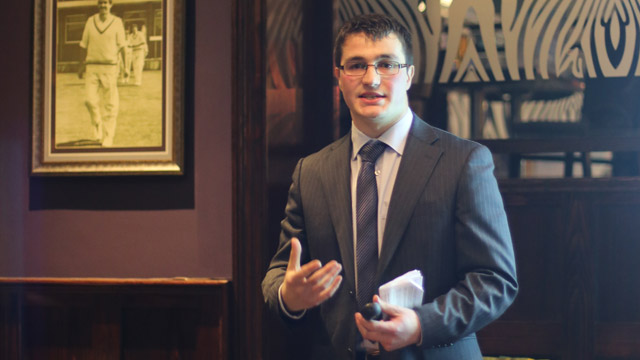
A Skeptical Look at Statistics
John Fletcher presents a talk on how stats are used and abused.
-
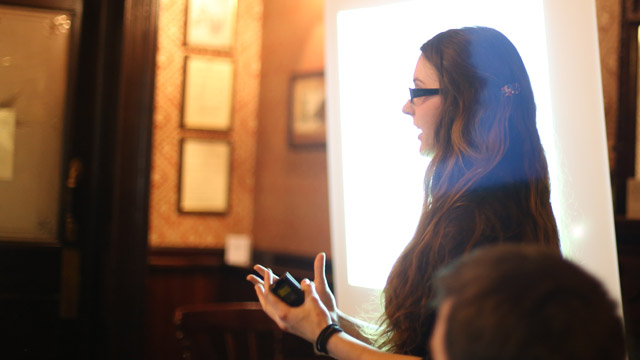
How Viruses Affect Evolution
In honour of Darwin Day, a talk about viruses. How they evolved, why they make us sick, how pandemics rise and fall, and how, without viruses, we wouldn't be who we are.
-
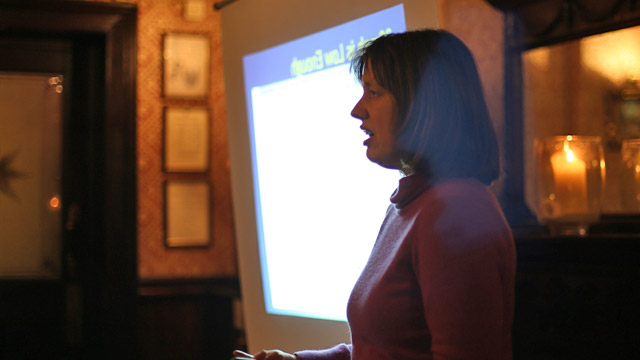
20's Plenty for Us
Total 20mph limits are sweeping the nation with 12.3m people now living in places committed to 20mph for over 90% of roads. This includes York, Manchester, Lancashire and 25% of London Boroughs. Anna Semlyen, National Campaign Manager of 20's Plenty for Us (with 207 branches) will counter the common 20mph myths.
-
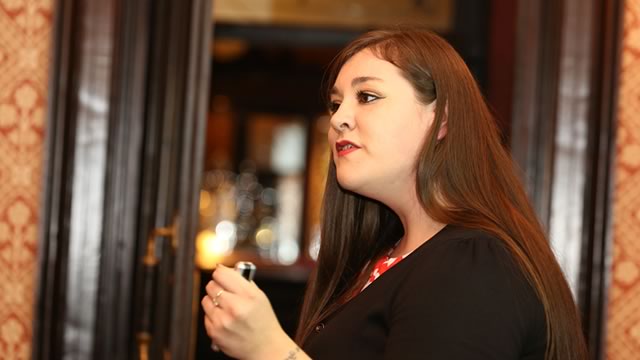
The Modern Face of Physiognomy
The notion that one can judge a person's character on the basis of their facial appearance is an idea that dates back to the ancient Greeks and for a short period, the practice of physiognomy was considered scientific. Despite the fact that this ancient practice has long been discredited, the idea that one can "read" a person's character simply by looking at their face still persists within folk psychology. In fact, this belief and our natural tendency to judge people on the basis of facial appearance has a surprisingly pervasive effect on all of our lives.
-
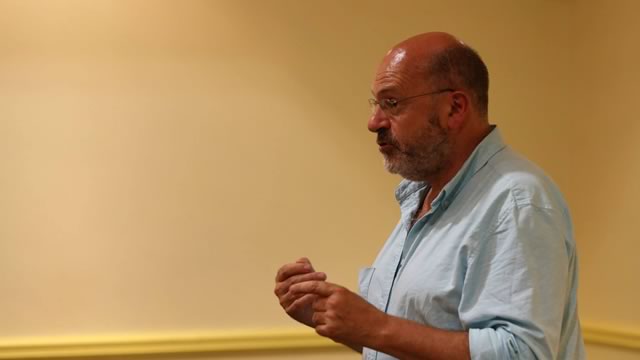
Oi! Scientology!
John Sweeney is 'psychotic, a bigot and a liar', and also the reporter who made the BBC Panorama programmes about the Church of Scientology.
-
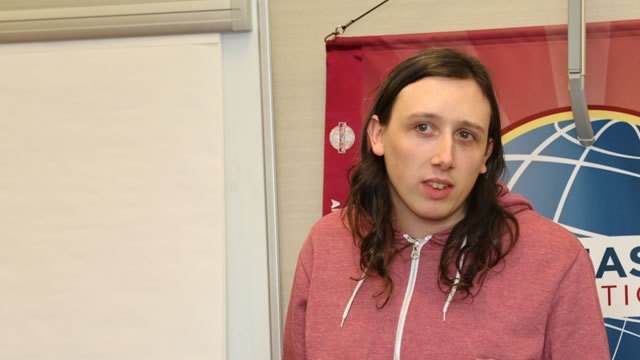
Homeopathy is Hokum
Chris Worfolk presents an introduction to the field of homeopathy, an alternative medicine that claims to offer miraculous healing properties, but is unable to demonstrate them under double blind clinic trials.
-
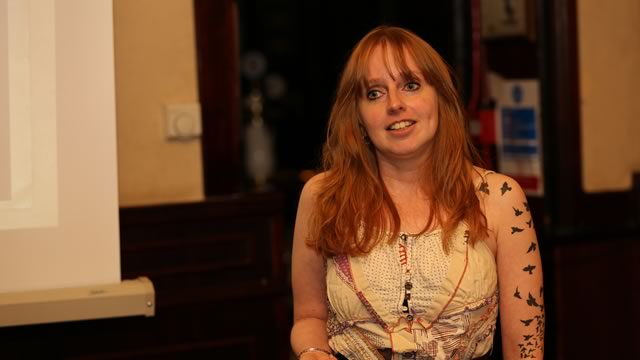
A History of Tarot
This talk was given at Leeds Skeptics under the title "Confessions of a Tarot Reader".
-
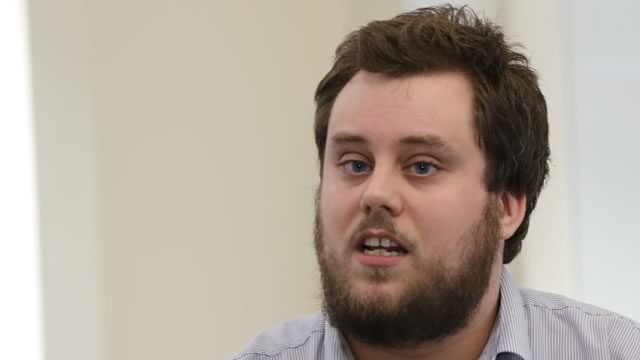
The European Witch Hunts
Hugh Clayden addresses three common misconceptions of the European Witch Hunts. Were they a persecution of pre-existing Pagan cults? Was it inter-religious persecution between Catholics and Protestants? Was it persecution of women by men?
-
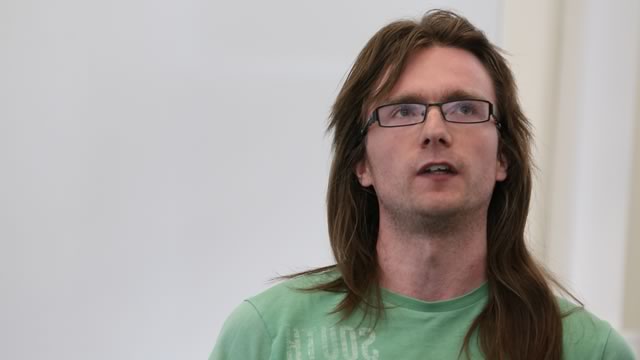
The Frontiers of Chemistry
James Murray presents a talk on where the latest research innovations in chemistry may be leading us.
-
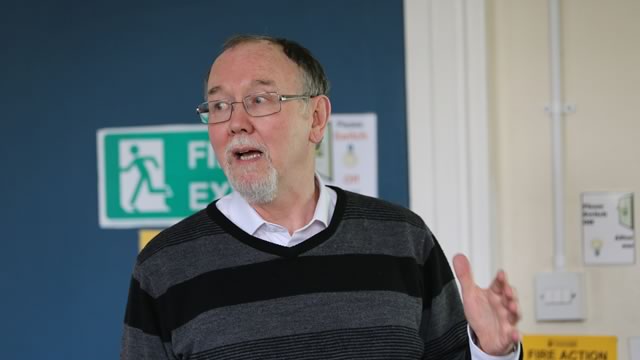
Origins of Islam
The talk is about the mythical origins of Islam. Most people know that much of the origins of Christianity and Judaism is mythological, but it is not so widely known that Islam's origins are similarly mythical. This is not least because Muslims insist Islam is rooted in factual history and get 'touchy' if this, or any aspect of Islam, is questioned.
-
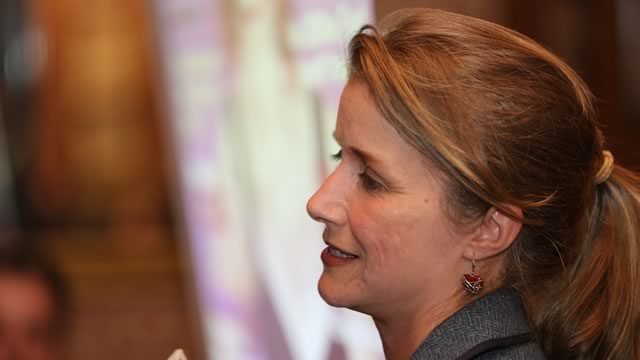
The Sex Myth
Is there any truth to the epidemic of sex addiction? Are our children really getting sexualised younger? Are men the only ones who like porn? Brooke Magnanti looks at all these questions and more - and proves that perhaps we've all been taking the answers for granted.
-
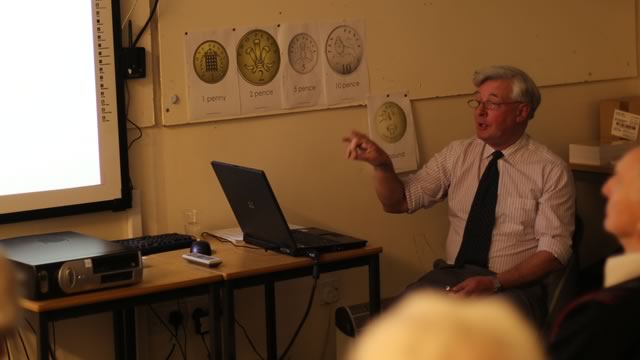
Good and Evil in Gospel Myth
Unfortunately we only captured the first half of this talk. Jim Hatfield explores the hidden meanings that can be found below the surface of Gospel language.
-
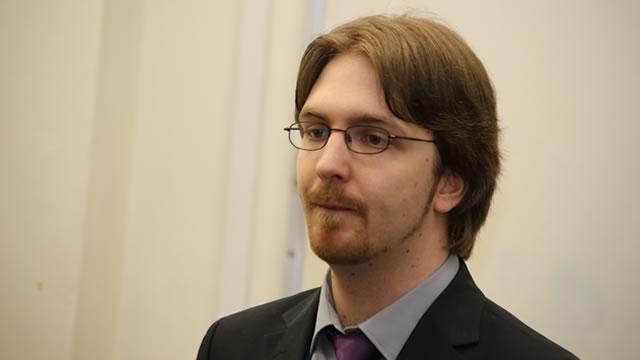
Disproving God With Philosophy
Heini Reinert looks as some of the philosophical arguments against god.
-
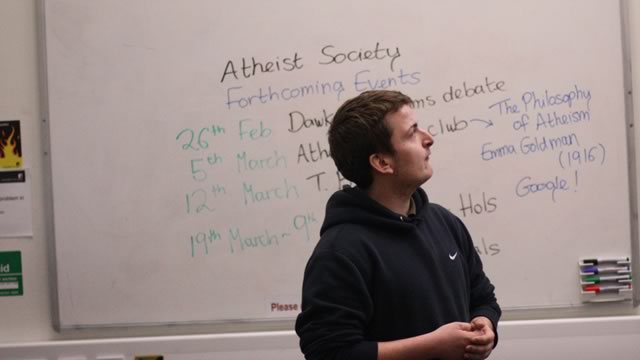
How Physics Has Shed Light on the Nature of Time
Josh Hulks presents a talk on what physics has to teach us about the nature of time.
-
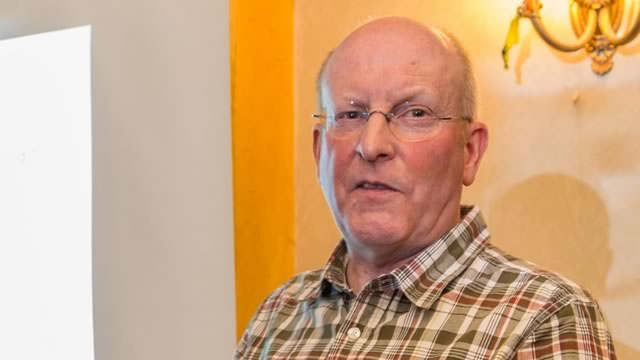
Superstition - The Odd Delusion
Where does superstition come from? Who are the most superstitious people in the world? Can scientists be superstitious? What about atheists? What's God got to do with it? Does it matter? Just some of the questions we'll explore, touch wood.
-
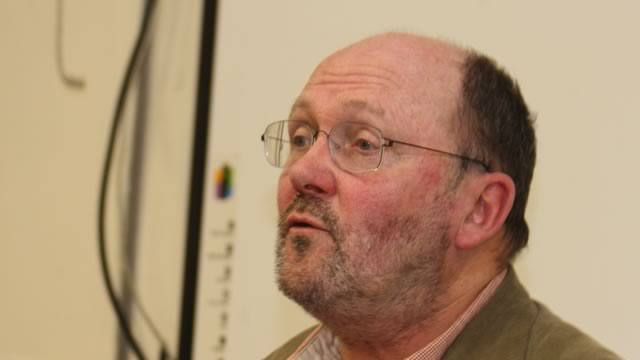
Death; a Not So Glum Look
Humanist Celebrant Matthew Simpson takes a more positive look at death and compares the differences between how Humanists and believers might view the prospect.
-
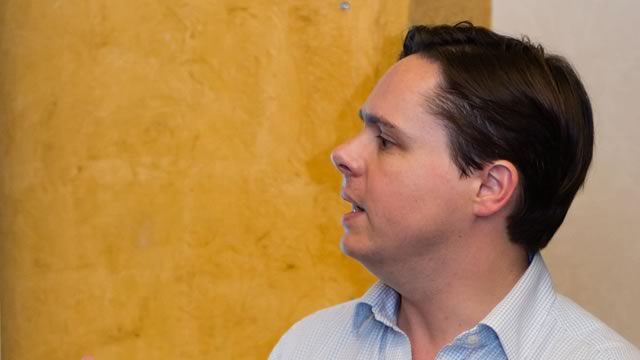
The Geek Manifesto
There are 650 MPs in the House of Commons. 158 have a background in business, 90 have been political advisers or organisers, and 86 are lawyers. Only one of them is a scientist. Is it any wonder that politics so often lets science down, and fails to exploit its skeptical methods to design policies that are fit for purpose?
-
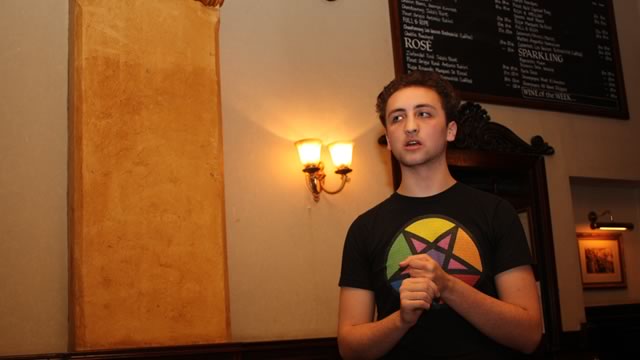
Going Soul-o: Lessons from an Atheist's time at Christian Camp
Alex Gabriel, former chair of Oxford Atheist Society, recently attended Soul Survivor - the largest evangelical Christian festival for young people in the UK. In this talk, he discusses his experiences at the event.
-
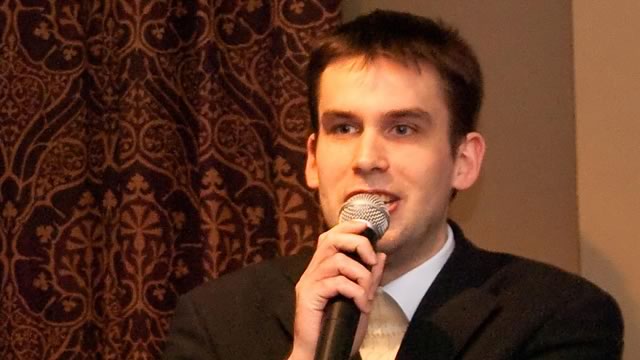
You Know Less Than You Think
Every day we all make perceptions of people and the world around us. But perception is a two-way process and most people don't stop to think about the biases inherent in their own perception. What are these cognitive biases and how much can they affect our judgement?
-

Mental Health
Chris Worfolk presents a short summary of how mental health is an area that touches all our lives, and why we need to premote a more open dialogue in society about it.
-
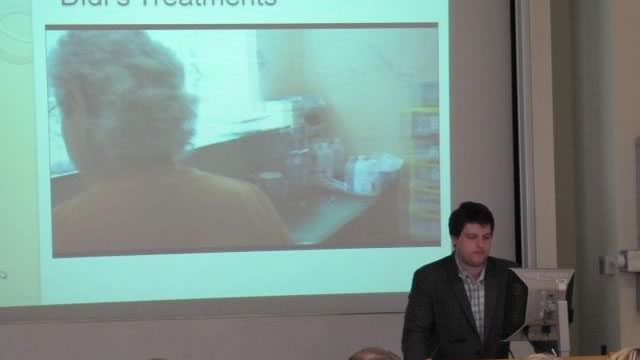
Bad Science in the Developing World
Martin Robbins, of the Guardian's Lay Science blog, reports on dangerous pseudo-medical practices outside the Western world, from homeopaths in East Africa to flat earthers and anti-vaccine campaigns in Nigeria.
-
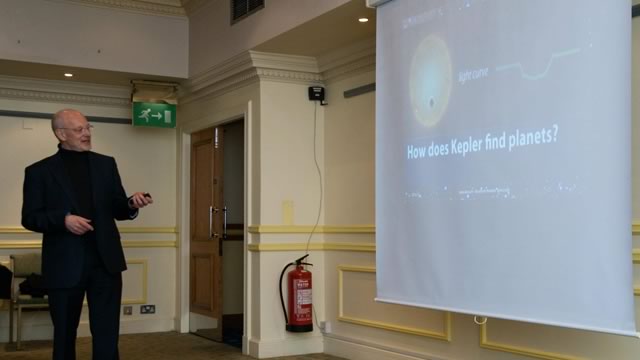
Is There Life Out There?
Two years ago the description of the Universe was changed from billions of stars in each of billions of galaxies to billions of planets in each of billions of galaxies. The probability of finding intelligent life out there looks like a certainty and however improbable life is, it looks as if we will find it sooner rather than later. How will it change our world?
-
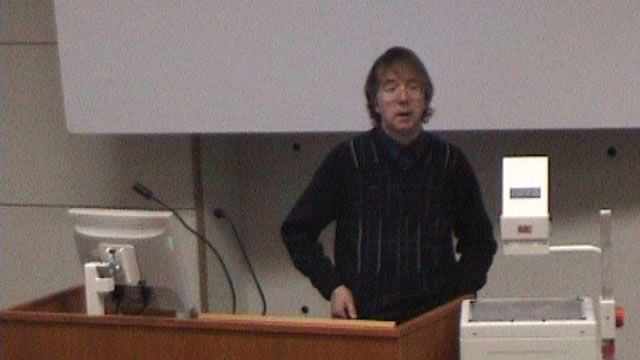
Scientific Standards: Does Religion Measure Up?
In memory of Gerry Hannant, who sadly passed away in 2010, we present the only known recording of one of his lectures, recorded in 2007 at Leeds Atheist Society.
-

Nothing
Why should nothing matter? If anything matters, why should nothing matter? And yet it does, for there isn't anything, it seems, that nothing does not touch, or anything that does not touch nothing. History, philosophy, religion, science, art, literature, music - all look towards nothing at some point, stimulating questions that would otherwise not be asked.
-
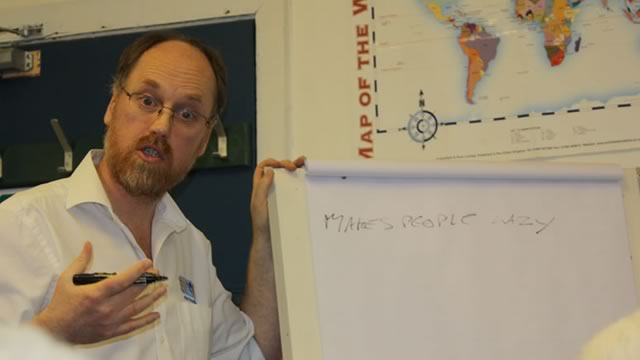
Social Networking
Simon Duncan presents and introduction to social networking and how it applies to non-profit organisations.
-
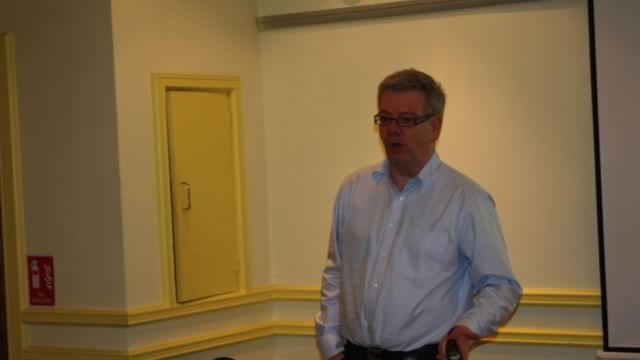
Arms Regulation
Dr Neil Cooper from the University of Bradford discusses arms regulation.
-

Brainwashed! A Cult Survivor's Tale
Arthur Chappell describes how he was seduced into an Eastern meditation cult in the early 1980's, despite being an ex-Catholic atheist. The talk takes you step by step through the process of conversion, so that you can see step by step how the cult world wraps itself around you, cutting off exits, making rational thinking and doubt difficult and later near impossible.
-
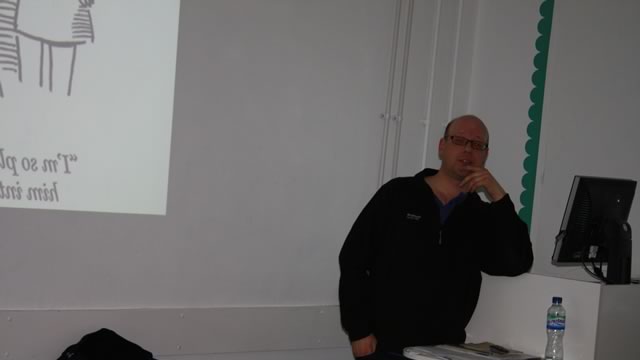
Faith Schools - Why It Matters
Dan Bye talks about faith schools and why we should be concerned about their current growth.
-
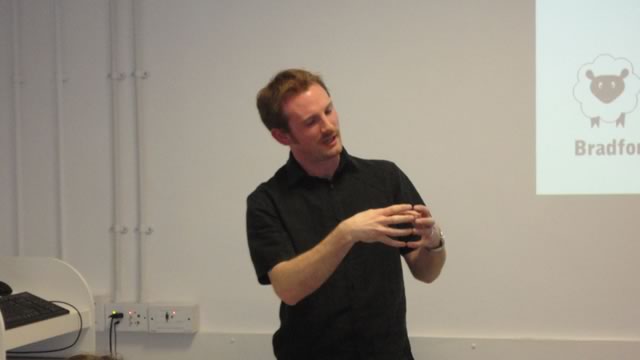
Neuroscience for the Soul
Dr. Craig Aaen-Stockdale (Optometry, Bradford) will give an introduction to the field of neurotheology, which attempts to relate religious behaviour and experience to the workings of the brain. He will review the current literature and give his own thoughts on what, if anything, this tells us.
-
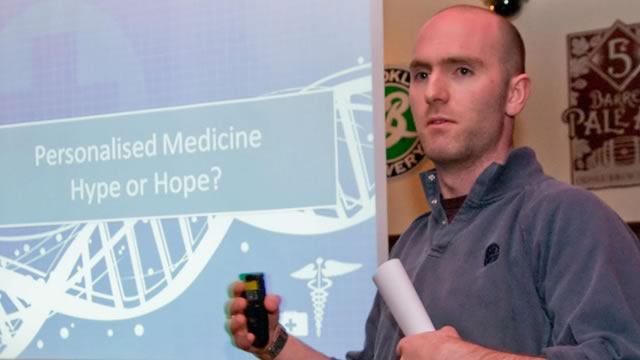
Personalised Medicine
In 2001 President Bill Clinton stood on the front lawn of the White House flanked by Francis Collins and Craig Venter. That day he announced the completion of the draft human genome, the first ever map of human genetic variation. At the time grandiose pronouncements were made about the coming genomic revolution concerning new cures for diseases and the eradication of cancer. Ten years on many have failed to be impressed by the impact of this scientific milestone, including equal sensationalising from the British media on this decade anniversary.
-
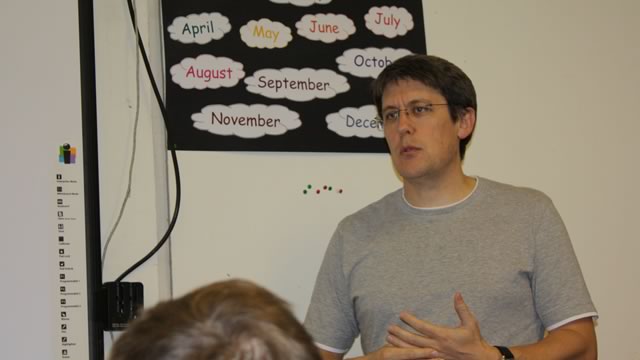
Talking to Creationists
Mark Edon discusses how the tslk to people who believe that the world is only 6,000 years old, in the face of insumoutable evidence.
-
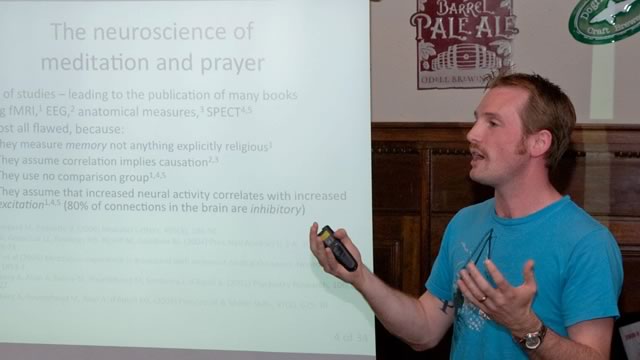
Neuroscience for the Soul
Dr. Craig Aaen Stockdale (Optometry, Bradford) will give an introduction to the field of neurotheology, which attempts to relate religious behaviour and experience to the workings of the brain. He will review the current literature and give his own thoughts on what, if anything, this tells us.
-
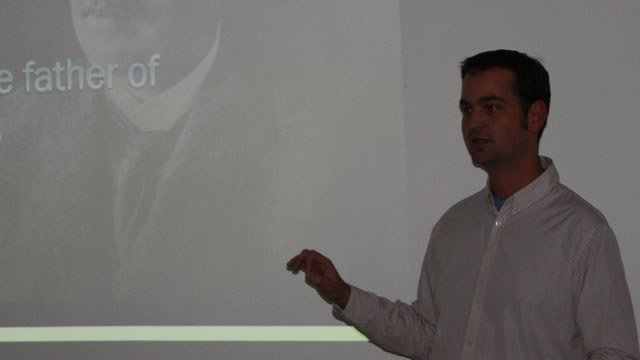
From Rutherford to the LHC
This year we celebrate the centenary of Rutherford's "discovery" of the tiny atomic nucleus at the centre of the atom. Why are scientists are still studying this topic a hundred years on? Professor David Jenkins from the University of York will explore the properties of the atomic nucleus and explain the origin of the chemical elements which make up our physical world.
-

Superstition
Superstition is often overlooked - while critics of religion have been vocal over the past decade, superstition is actually far more prevalent in our society from phrases like "touch wood" to crossing our fingers and avoiding the number 13.
-
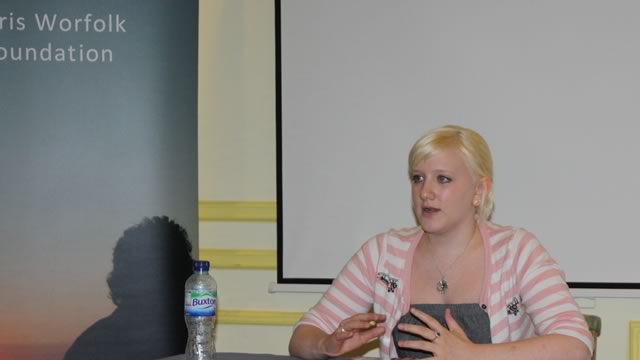
Slutwalk Leeds
Lucy discusses her experiences as one of the co-organisers of the Leeds Slutwalk. The Slutwalk movement began in Toronto, Canada when a police officer suggested that a a victim of rape may be partly responsible for the attack, because of the way she was dressed. As a result a worldwide protest movement has sprung up with people taking to the streets in organised events.
-
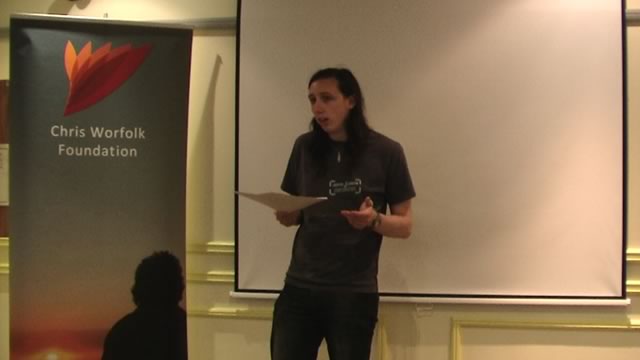
Humanist Action Group
The Humanist Action Group is a volunteering organisation which runs several programmes, including homeless outreach.
-
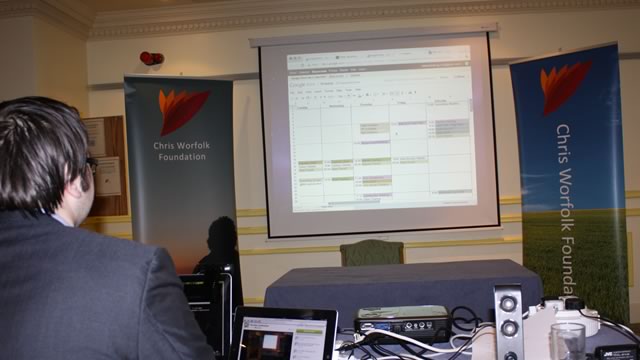
Web Technologies for Societies
Michael Burgess presents an introduction to the various web technologies that can help societies and groups organise, coordinate and manage their activities.
-
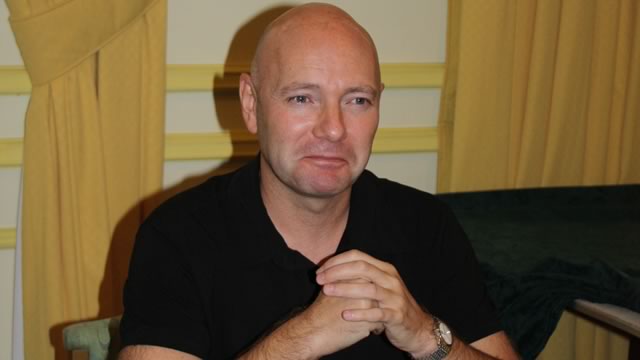
Leeds Salon
Paul Thomas is co-founder of Leeds Salon, a public debate group based in Leeds. In this talk, he discusses how he started the group and shares his experience and advice on starting such an organisation.
-
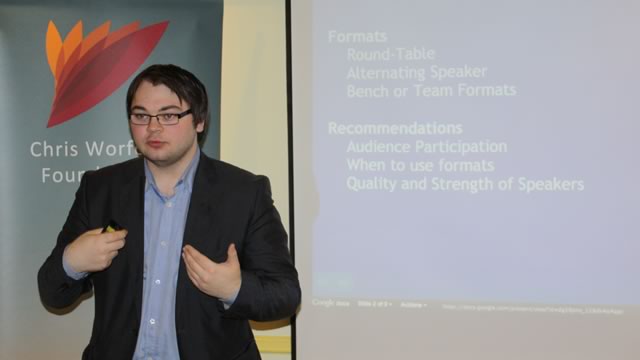
Introduction to Public Speaking
Michael Burgess presents an introduction to public speaking, with a specific focus on staging, chairing and speaking in debates.
-
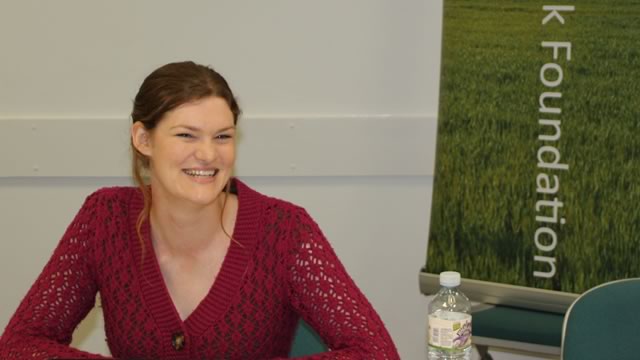
Coordinating National Events
Nicola Jackson offers advice on how to coordinate national events, reflecting on her experiences working with the National Federation of Atheist, Humanist and Secular Student Societies, including running a student camping weekend.
-
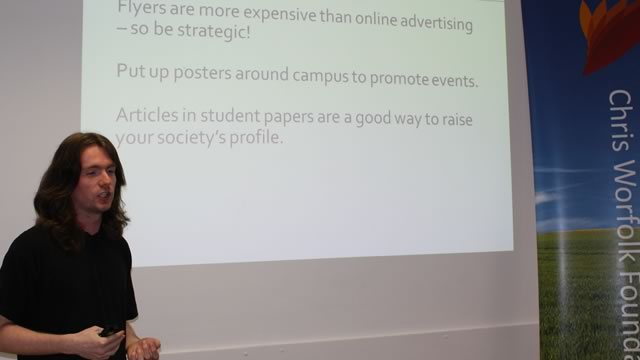
Activism on Campus
James discusses his experience running Leeds Atheist Society and the National Federation of Atheist, Humanist and Secular Student Societies, and how best you can coordinative groups and events on campus.
-
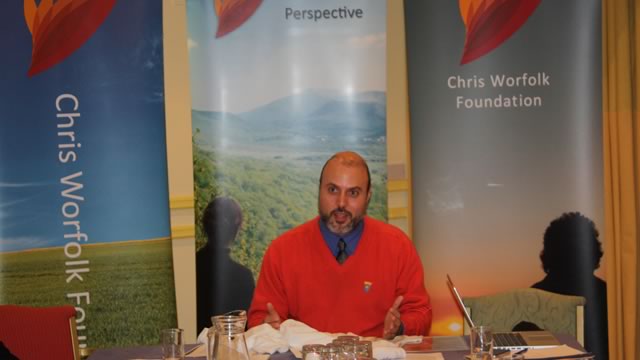
Perspective: Zoroastrianism
As part of the 2011 Leeds Perspective Citywide course, Malcolm Deboo presents an introduction to what is generally regarded as the world's oldest monotheistic religion - Zoroastrianism.
-
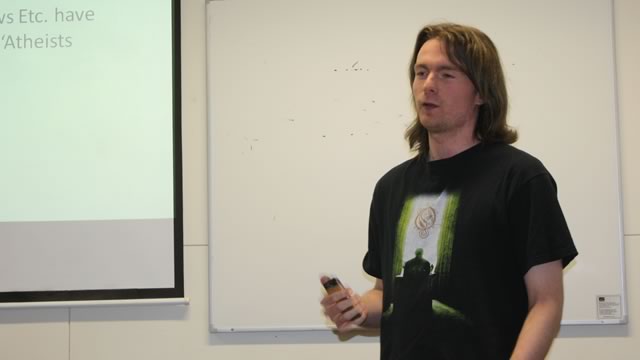
Christmas Traditions Around the World
Although the Christian traditions for the Christmas holiday have come to dominate Western society, many cultures around the world have their own different holiday traditions.
-
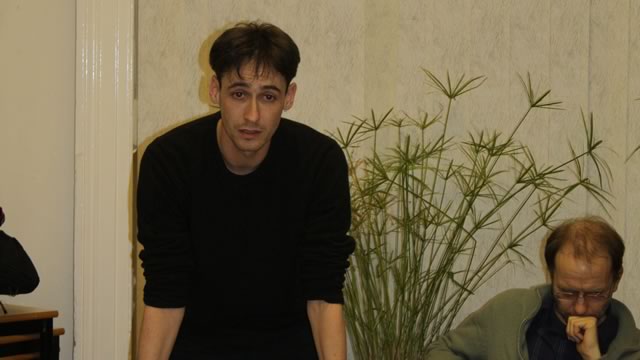
Humanist Chaplains: For and Against
The idea of Humanist Chaplains has been a poloarising issue within the non-religious community. In this debate, recorded as the Swarthmore Centre, as part of Leeds Reason Week 2011, sees Dr Paul Dean and Dr Gijsbert Stoet put the arguments for and against Humanist Chaplaincy.
-
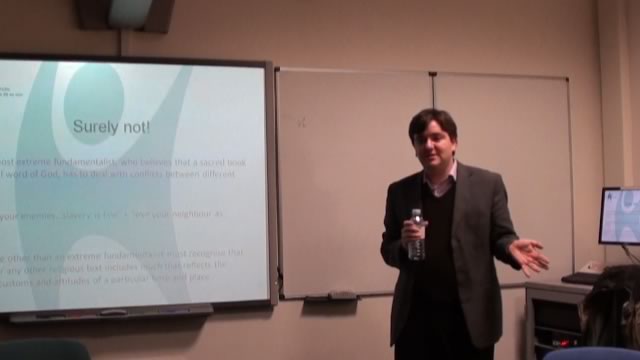
Thinking About Ethics
As part of Reason Week 2011, Leeds Atheist Society invited Andrew Copson to take part in a debate against a speaker from the Islamic Society. Unfortunately, ISoc pulled out at the last minute, leaving Andrew as the sole speaker. Never the less, in less than a day, Andrew managed to put together this fantastic talk on thinking about ethics.
-
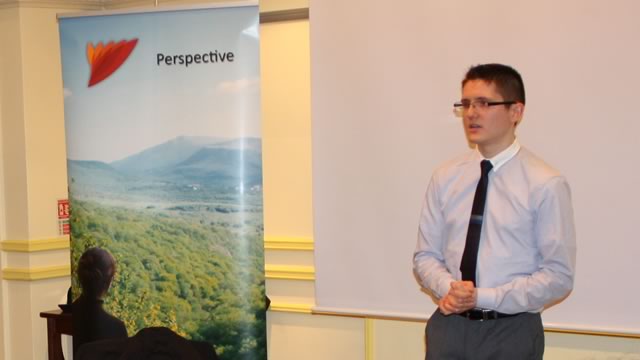
Perspective: Scientology
Recorded as part of the Leeds Perspective Citywide course that took place in 2011, Sam Butler presents an introduction to Scientology.
-
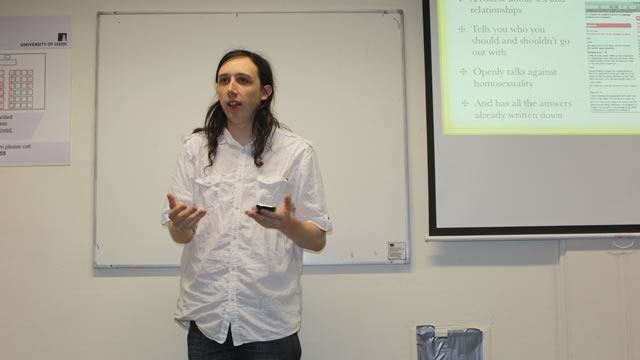
The Atheist Responses
Chris Worfolk regularly discusses some of the most common arguments that come up when discussing religion and what the arguments and counter-arguments to these are. These can be seen in the "Debating the Theists" talk which can also be found in the collection.
-
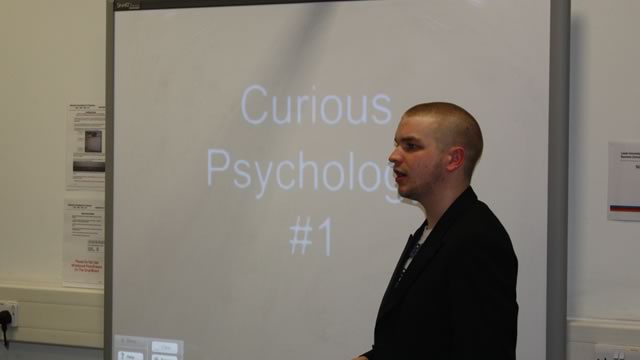
Stop Playing Tricks on Me
The Amazing Leo Dragon presents a talk on the psychology of all things strange, from magic to psychics, from spoon bending to astrology. A whirlwind tour of why people really jump at the explanations given by the "professionals", with some live magic thrown in along the way.
-
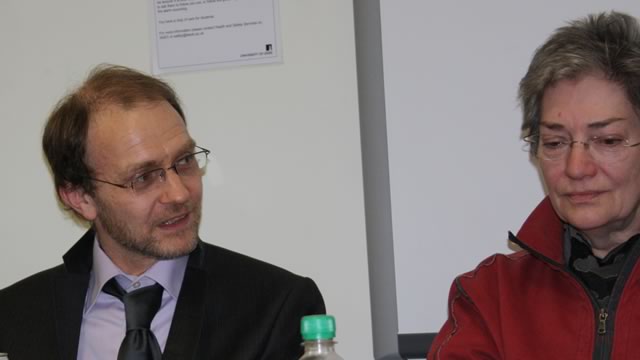
Religion as a Human Creation
Over the past century, there has been a steep decline in religious adherence. However, some groups, including many Quakers, Universalists, Humanists and even Anglicans have continued to find benefit from religion, despite discarding their belief in a god.
-
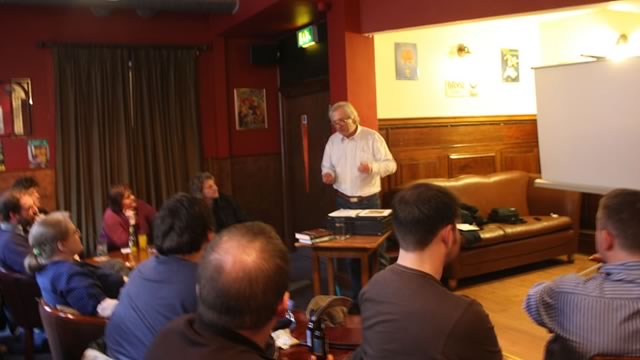
Not a Chimp
Jeremy Taylor, author of "Not a Chimp" argues that there are actually significant differences betweens humans and chimpanzees and that this reality requires a different approach to animal welfare.
-
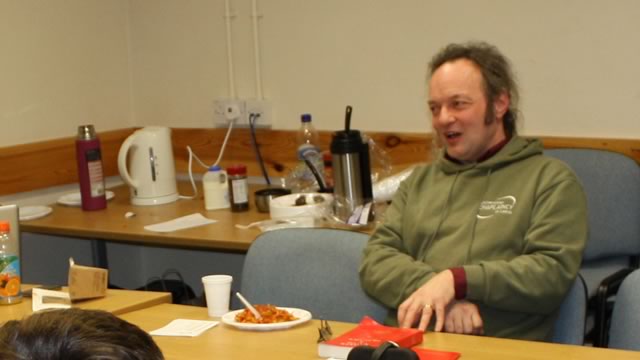
Perspective: Quakers
Recorded as part of the Leeds Perspective Citywide course which took place in 2011, University of Leeds chaplains Robin Fishwick and Chris Whichelo present an introduction to the Religious Society of Friends, better known as Quakers.
-
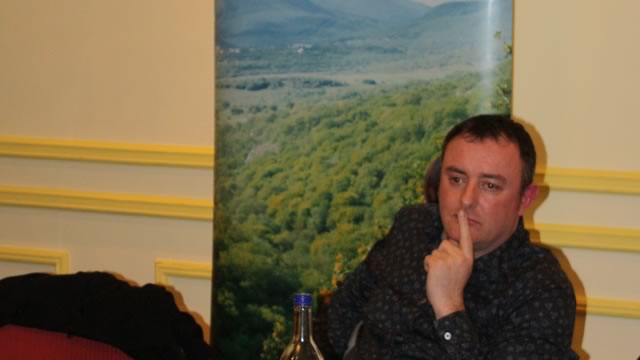
Perspective: Humanism
Recorded as part of the Leeds Perspective Citywide events in 2011, Tim Stephenson presents an introduction to Humanism.
-
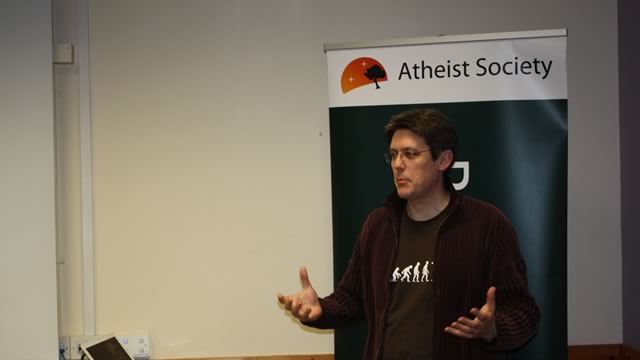
Creationism
Evolution is a topic which is accepted by not only the scientific community worldwide, but now pretty much everybody - including the Church of England and the Vatican!
-
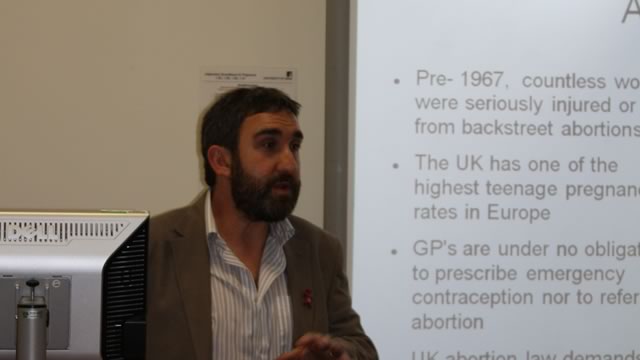
Cutting Religion out of Medicine
Recorded as part of Leeds Reason Week 2011, Dr Antony Lempert, coordinator of the Secular Medical Forum, discusses the problems encountered when religious beliefs come into conflict with modern medicine.
-
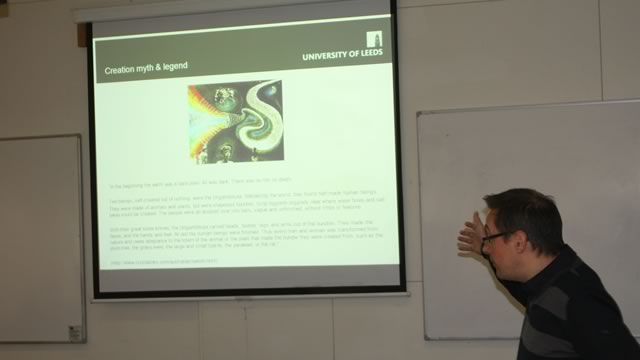
Origins of Life on Earth
Dr Terrence Kee discusses the possibility that life could have first traveled to Earth on an asteroid.
-
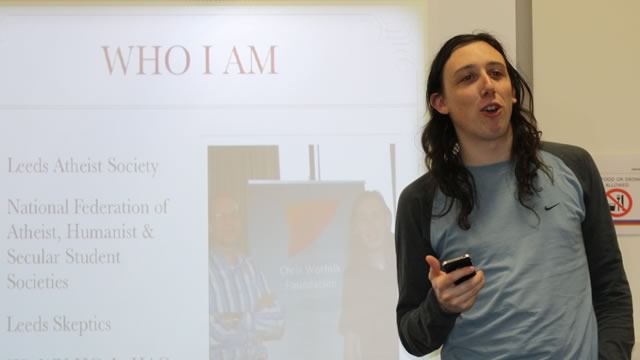
A History of Atheist Charity
People have often claimed that religious people are more generous when it comes to giving to charity. The stats don't hold up though - Sweden give the biggest percentage of their GDP to charity in the world; they're also one of the most irreligious nations.
-
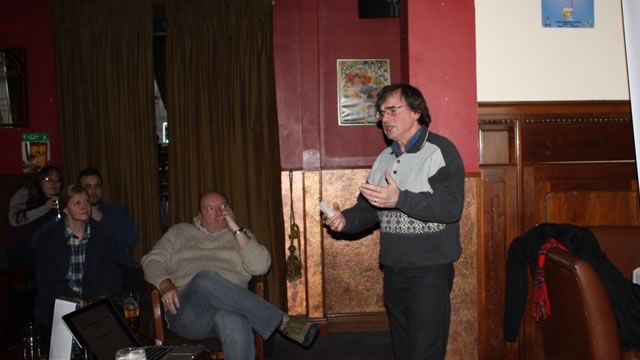
Why do People do Weird Things?
Human behaviour often appears to be maladaptive, pointless, ineffective for its expressed purpose, and even completely absurd. In this talk Michael Heap will examine, with the aid of demonstrations and videos, some examples of odd behaviour that is based on unusual and paranormal ideas and beliefs. These will include healing practices, dowsing, hypnosis, and communication with "the spirit world."
-
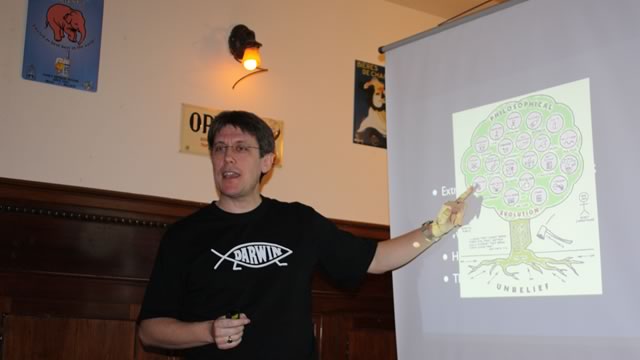
Creationism
In this talk, delivered to Leeds Skeptics in the Pub, Mark Edon discusses how creationists in the UK have been trying to infiltrate our school system in order to push their religious ideology.
-
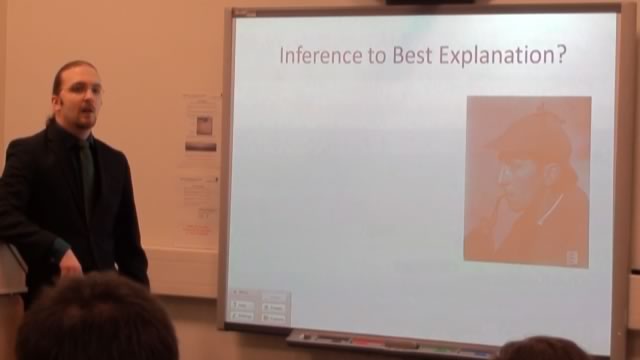
Intelligent Design
Heini Reinert discusses the abject failure of the Intelligent Design movement to put forward a coherent theory that could be considered science.
-
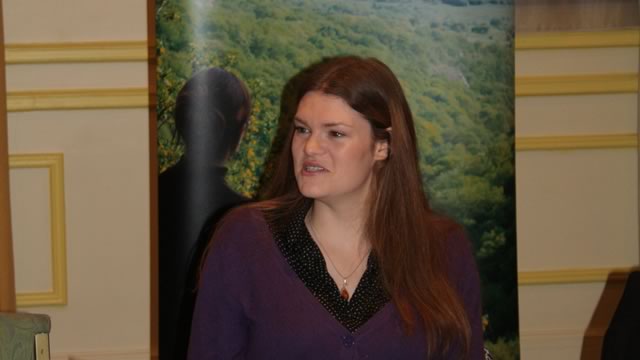
Perspective: Judaism
As part of the Leeds Perspective Citywide series that took place in 2011, Nicola Jackson presents an introduction to Judaism.
